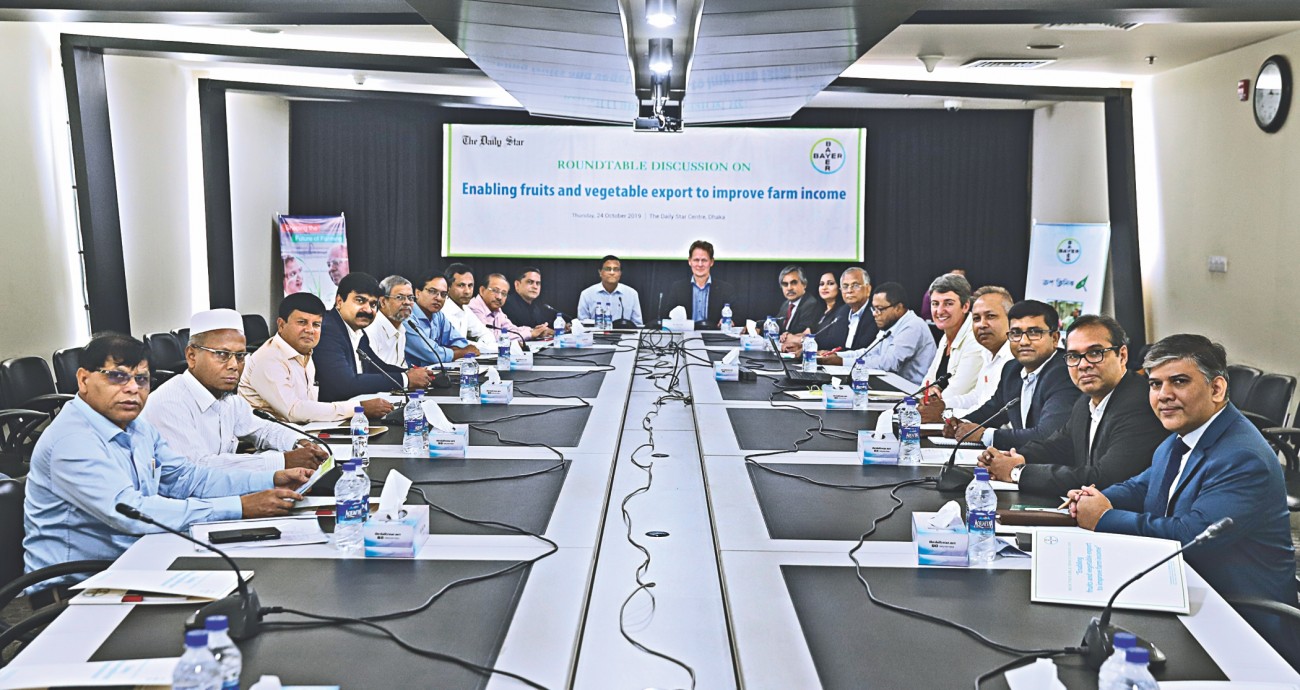Quality key to boost fruits, vegetables exports

Bangladesh has been failing to export its fruits and vegetables, which are in surplus now, due to a lack of quality and variety sought by importing countries, experts and businesses said yesterday.
Amid this situation, they said Bangladesh needs to take concerted efforts to ensure safety and certify farmers so that they get fair prices for products.
Adoption of good agricultural practices (GAP), be it local, regional or international, could address safety concerns of consumers, they said.
Their comments came at a roundtable on “Enabling fruits and vegetable export to improve farm income” organised by Germany-based Bayer CropScience in association with The Daily Star at the The Daily Star Centre in Dhaka.
Albert Schirring, global crop manager for vegetables and potatoes of Bayer CropScience, said Bangladesh has a huge number of people ready to pay higher prices for quality products while their export also has huge potential.
“Certifying farmers is very very important. As the global GAP is a very high standard quality, Bangladesh can develop its own GAP for its farmers, traders and exporters,” he said.
The government can set a guideline which should be followed by all, he said, adding that farmers would happily adopt GAP when provided training, support and especially fair prices.
“So, raising quality of product is a way to improve farm income,” said Schirring.
Md Abdur Rouf, additional secretary to the agriculture ministry, said the government has a target to make farming profitable through quality improvements so that the products can compete in the global arena.
Quality control is most important when it comes to export but sometimes many of the country’s farmers do not maintain it, he acknowledged.
“The government is trying to issue common certification for agricultural products which would be accepted globally but the main problem is accreditation, so we are establishing three accreditation laboratories, one of which is already in place.”
Nearly 100 types of vegetables and 60 varieties of fruits are being grown in Bangladesh. The country currently ranks third in vegetable production in the world and 10th in tropical fruits production.
Lutful Hassan, vice-chancellor of Bangladesh Agricultural University, said the government was trying to formulate GAP but partnerships were very important to get good results out of it.
The government, foreign partners, private sector, mass media and non-governmental organisations should work together to ensure quality of agricultural products, he said, adding that a rise in product quality would automatically draw importers.
Shaikh Abdul Quader, president of Bangladesh Potato Exporters Association, said they had to fulfill many conditions and GAP for potato export.
However, they are yet to take exports to target volumes for a lack of varieties sought by importing countries, he said.
“Once potato was a blessing. Now it poses a problem of surplus so we have to take every preparation for export,” he added.
Monjurul Islam, adviser to the Bangladesh Fruits, Vegetables & Allied Products Exporters Association, said the country’s production of food and vegetables was huge and while there was substantial demand overseas, businesses failed to benefit for compliance issues.
“Our farmers are fragmented with small lands, so it is difficult for them to fulfil compliance needs,” he said, adding that they have made cluster groups where GAP were partially in practice.
The country is producing 16 million tonnes of vegetables against a demand of 13 million tonnes, he quoted agriculture ministry data.
The government, Bayer CropScience and the private sector will have to work together to make sure that compliance requirements were met and GAP followed, he added.
Shusmita Anis, managing director of ACI Formulations, said they were running contract farming with over 400 farmers to get quality products.
She said there should be a public-private partnership to work together to ensure quality of agricultural products.
Anil Kumar Das, national consultant of the Food and Agriculture Organization in Bangladesh, said the country should prioritise analysing potential and limitations of crops and farming locations for exports.
Sazzadul Hassan, managing director of BASF Bangladesh, said they had the technology to identify chemicals used in crops and to achieve energy efficiency in cold chain insulation.
Md Abul Kalam Azad, director of the Export Promotion Bureau, said the country’s export earnings from agricultural products have declined by 50 percent in five years despite having a high demand abroad.
“We need GAP auditor for particular products which is not available now and enriched laboratories to issue certification of products. We can’t meet the demand of importers and their demands are quality and proper certification,” he said.
Md Manzurul Hannan, managing director of Hortex Foundation, said sometimes farmers were deprived of fair prices despite producing quality products.
Md Shamsul Alom, deputy director of the Department of Agricultural Extension, said if farmers were able to produce quality products, the market and demand would be there. AFM Fakhrul Islam Munshi, president of Bangladesh Agro-processors’ Association, said Vietnam and Thailand export around $35 billion worth of fruits and vegetables a year each while for Bangladesh it is only around $100 million.
“Exports will not rise if we cannot maintain quality,” he said.
Bangladesh needs adequate infrastructure, such as food storage facilities, special space in ports and cooling chains and a reduction of transportation times to increase quality of agricultural products so as to increase exports, he said.
Sajjadur Rahman, business editor of The Daily Star, moderated the programme.
